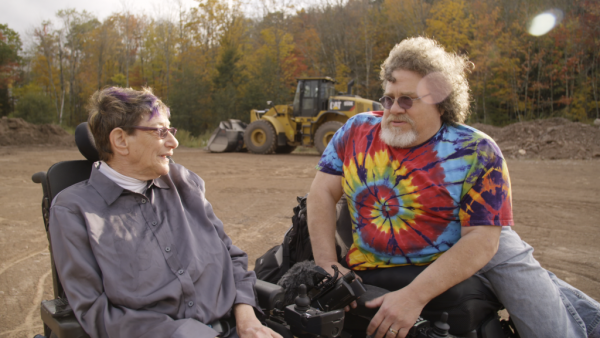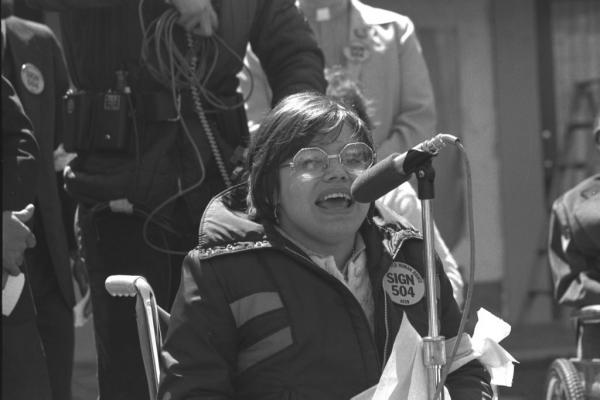![Text: Crip Camp: Catalyst for Change, "An all too relevant reminder for Civil Rights is never over [and] a testament to the power of constructive civil disobedience". The image features four individuals, some with disabilities, holding signs withe text on them. Some text is also over a sun icon.](/sites/default/files/optional_hero_image/Copy%20of%20Copy%20of%20Untitled.png)
By: Austin Clack
Hunger strikes, Black Panthers, and summer camp. Crip Camp follows the arduous path of disability rights leaders from modest campgrounds in the woods of upstate New York to a culminating triumph on the White House lawn. Film directors Nicole Newnham and Jim LeBrecht provide an all too relevant reminder that the fight for Civil Rights is never over. Separate is never equal and Crip Camp is a testament to the power of constructive civil discourse as well as reveals how much further we have to go concerning Disability Rights and Civil Rights as a whole.
Camp Jened was founded in 1951 and saw the height of its participation in the 70s while encompassing the free-love culture of the era. Alumni described Camp Jened as an inclusive Woodstock where teens could be themselves without fear of being stereotyped, judged or gawked at. The band of misfit campers we meet through the black and white archival footage shot by Jim Lebrecht’s Super 8 camera bears a remarkable resemblance to the group of teens in any summer “coming of age” movie. Campers had romantic summer flings, played music by the campfire and spent their days frolicking around the campgrounds. While there, they learned to form a community that was strengthened through a shared experience of exclusion. As camper Denise Jackobson fondly remembers years later, “When we were there, there was no outside world.”

Made to feel such an ostracized existence, it's no wonder the camp’s counselors and kids that returned year after year thought of Camp Jened as an oasis for equality.
People with disabilities, especially teens, are often infantilized and treated as though the limitations of their bodies translate to limitations of their aspirations, relationships and social capabilities. At Camp Jened, this sentiment could not be further from the truth. The shared experience of normalcy at camp was certainly transformative. In the 1960s and 70s, Americans with disabilities were still often denied a normal education, asked to leave public places, rejected from jobs for which they were qualified, and ran a daily gauntlet of discrimination. However, at Camp Jened a speech impediment from cerebral palsy was no reason not to be heard and being in a wheelchair did not exclude you from playing baseball with the other kids. Camp Jened gave teenagers who had known nothing but society’s indifference to their existence a glimpse of how the world could be and provided them with the self-assurance to make that world a reality.
The movement that eventually led to the 1990 passage of the Americans With Disabilities Act may not have ever been possible without the leadership of Camp Jened alumni. The latter half of the film focuses on Judy Heumann, a former camp counselor and organizer of some of the most impactful demonstrations of the Disabilities Civil Rights Movement.

As an able-bodied person with limited exposure to disability culture prior to watching Crip Camp, I was ignorant to the fact that a civil rights movement ever took place for the disabled community. The shameful reality of the inequity that dominates our society was revealed to me when I saw images of people with advanced cerebral palsy and other physical disabilities sleeping on the dirty floors of federal buildings in protest for basic accessibility. Until the 90’s, and even still today, accessible architecture has all too often been dismissed as unimportant and relevant to too few people to be prioritized. Jim Lebracht recalls being forced to pull himself up a large flight of stairs while dragging his wheelchair behind him due to the lack of accessible infrastructure at Grand Central Station, one of the most frequented and notorious centers of transportation in the world. As the largest minority group in the United States, the basic needs of disabled people cannot be ignored and must be met in order to realize equality and shared quality of life among all people.
Most powerful in my mind was the cooperation between the many participants of the protests and occupations as well as added support from leaders of other movements as well. When engaged in a 26 day long occupation of the Health Education and Welfare building in San Francisco, members of the Black Panther Party served hot meals to occupiers. One such Black Panther is quoted as saying, “We support you because you're asking America to change, to treat you like human beings, like you belong.” The Disabilities Civil Rights Movement was certainly by and for the disabled community but grew to become all-encompassing, just as other Civil Rights Movements had. The exclusion of anyone from the rights guaranteed under our country is a breach of freedom and trust for everyone. Judy Heumann’s organization of the movement under the idea that accessibility was fundamental to equality revealed that equal opportunity is impossible when the faculties of society are not universally available and functional to all. This is central to all debates of civil rights. Today, protest continues as millions of people worldwide have taken to the streets in solidarity for the Black Lives Matter Movement. Whether the issue is race or disabilities, those that ordinarily are ignored and discounted have amplified their message through protest.
This is the American history lesson students are seldom taught in school. When democracy fails to serve its purpose and the rights of any group are neglected, it is the responsibility of not only the minority to take action against oppression. It is impossible not to be inspired watching a march led by people in wheelchairs, in which protesters have to quite literally pull themselves up the Capitol steps. Crip Camp isn’t about disability so much as it is about the unfaltering ability of a disregarded community to overcome physical and societal barriers to be treated with the same dignity and compassion as anyone else.
Originally Posted: 11 June 2020

